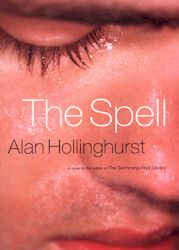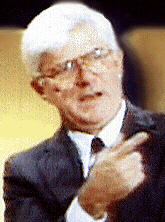 |

 The Ghosts of Christmas Past |
|
By Ann Northrop
What confuses me is why Updike felt compelled to review this book, "The Spell" by Alan Hollinghurst, in the first place. He is completely unselfconscious about his disgust at gay men, singling out a passage from the book about oral-anal sex to quote early on.
But with so many books and so few pages, why is it, John, that you feel compelled to review a book which is certainly not hitting the best-seller list and which so obviously repels you? And why, people at The New Yorker, would you publish this garbage? Is this what strikes you as intellectually stimulating? Is this what you consider important enough to fill one and a half of your precious pages? Are you trying deliberately to annoy us? Or are you just really, really stupid? As I reread the review, just to convince myself he really said what I think he said, I found one sentence towards the end the most overtly offensive (although there are many other candidates). As he winds up his piece, Updike zeroes in on his real complaint about gay male relationships where "nothing is at stake but self-gratification." "Novels about heterosexual partnering,"
 Updike explains, "however frivolous and reducible to increments of selfishness, social accident,
foolish overestimations, and inflamed physical detail, do involve the
perpetuation of the species and the ancient, sacralized structures of the
family."
Updike explains, "however frivolous and reducible to increments of selfishness, social accident,
foolish overestimations, and inflamed physical detail, do involve the
perpetuation of the species and the ancient, sacralized structures of the
family."
This guy is a monster! Stupid, ignorant and hateful. And certainly all John Updike has ever cared about, particularly in his relationships with women, is self-gratification. I thought thirty years ago that I could live my life happily and safely without ever having to pay any attention to Updike. I'm horrified to see him rise up, like the ghost of this column's title, to haunt us yet again. Which brings me to the second ghost. I was having a nice, quiet Memorial Day weekend when my channel surfing turned up another refugee from the way-back machine, Phil Donahue. You remember Phil. Credited with inventing the audience-participation talk show thirty years ago in Dayton, Ohio. Gave it up three years ago when newer, more extreme shows swiped his audience. Tried to do a serious show on CNBC but no go. Once eager to run for political office (Senator from New York). Not really heard from in a while. Until the recent verdict in the civil suit in the "Jenny Jones" case, where the jury awarded many millions to the surviving family of the dead gay man, holding the TV show responsible for his murder. According to the jury, the show should have known that springing a gay crush on an unwelcoming object would be a clear provocation to murder. The strongest statement of outrage at the verdict was...Phil's!
Well, Phil is looking pretty good. Has lost weight, looks slim and trim, but, most of all, he seems a lot more relaxed, less maniacally ambitious and pompous. Maybe some time off the front lines has changed his priorities. And, maybe for the first time, I finally bought his pro-gay line. It seemed more organic now. While the "Jenny Jones" case came up, and Phil repeated his analysis of the homophobia in the verdict, he didn't confine his pro-gay remarks to that. Russert was asking him about the history of his program and what he thought it accomplished. Phil said immediately that he was perhaps most proud of the shows he'd done with gay people, especially early on (as opposed to one of his shows I was on where he tried to pit me as a lesbian against several bisexuals--nice try, Phil). He talked quite movingly about his own learning curve, how he came to see what courage and dignity gay people had in standing up to a society that hated (hates?) us. I suppose I could suggest that the lesson of all this is that noone ever disappears for good. Just when you've forgotten them or written them off, they turn up, for better or worse. But what really struck me about hearing from these guys again is how, as one ages, the recurrent appearances of people from the past sets your mind vibrating with many layers of many years of experiences. It's all just what we used to call "surrealism in everyday life" and it gets richer as you go on. |

© 1997-99 BEI
 John Updike
John Updike  Phil Donahue
Phil Donahue